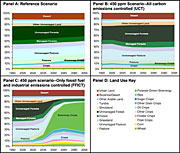- Number 292 |
- August 4, 2009
Terrestrial CO2 economically important in greenhouse gas control
Without a universal carbon tax,
there’s more incentive to use
land
for bioenergy crops
(panel C)
than for food and
fiber crops
(panels A and B).
(Click image for larger size.)
Limiting greenhouse gas concentrations to low levels requires the development of policies to address land-use change emissions as well as fossil fuel emissions, notes a recent study by the Joint Global Change Research Institute, a collaboration between DOE’s Pacific Northwest National Laboratory and the University of Maryland. Land-use policies that encourage deforestation could lead to the release of massive amounts of carbon dioxide into the air just as industrial activities do and could frustrate efforts to limit climate change. The study also suggests improved agricultural technology will be as important as new energy technology in a carbon-limited future. The results of this work appeared in the May 29 issue of Science.—Andrea McMakinh
[Kristin Manke, 509.372.6011,
kristin.manke@pnl.gov]

